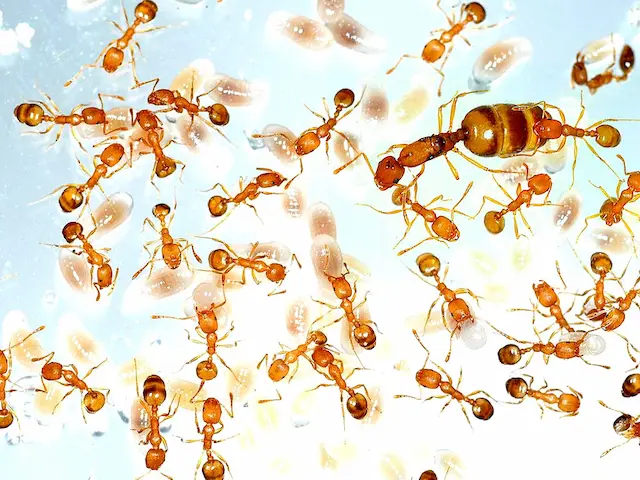Because citronella ants smell like lemons, they often make people curious and ask them questions. These ants are known to smell like citronella when they are bothered, which is how they got their name. But are they dangerous invaders that need pest control right away, or are they mostly harmless? Let’s learn more about citronella ants and see how they affect homes and the world around them.
How to Identify It and What It Is Like
The Lasius genus includes two main kinds of citronella ants: the larger yellow citronella ant (Lasius interjectus) and the smaller dark citronella ant (Lasius claviger). Even though they look different, there are some things that both species have in common:
- Size: The workers of citronella ants are between 1/4 and 1/2 inch long, which is pretty big.
- Colour: Yellow citronella ants are yellowish, while dark citronella ants are dark brown to black.
- Odour: One of the things that makes citronella ants stand out is the lemony smell they give off when they are bothered. This smell is a form of defence that keeps predators away.
- Habitat: Citronella ants usually live outside in soils that drain well, often near rocks or sidewalks. They have also been known to build nests inside, especially in damp places.
What we eat and how it affects us
Citronella ants are not pests in the usual sense because they don’t hurt people or damage property. Citronella ants don’t damage structures like carpenter ants do, which dig through wood. They mostly eat honeydew, which is made by aphids and mealybugs that feed on plant sap.
Their effects on fields and plants are not always good or bad. On the one hand, they can help control the number of aphids and mealybugs by eating the sap that these bugs make. This can help make the environment of plants healthier. On the other hand, their appearance can also mean that these insects, which feed on plant sap and can hurt plants, are nearby.
How to Know When to Worry
Even though citronella ants aren’t dangerous on their own, their appearance can sometimes be a sign of bigger problems:
- Moisture Problems: Moisture is a draw for citronella ants. If you find them inside, it could mean that there is a problem with water, like a leak or not enough air flow.
- Plant health: If citronella ants are always on plants, it could mean that there are aphids or mealybugs that need to be taken care of.
- Structural Entry Points: If citronella ants keep coming into your home, they may be getting in through cracks or holes. By fixing these places of entry, you can stop other pests from coming in as well.
Taking charge and managing
If you find citronella ants inside and they are bothering you, you can do the following:
- Find the source: Find the entrances and the nests. This could mean looking around the outside of your house for places where water could get in.
- wetness: If wetness is what’s drawing the citronella ants, fix the problem. Fix leaks, improve airflow, and deal with places where there is too much moisture.
- Seal Entry Points: Fill in cracks and holes in your home’s walls and base to keep ants out.
- Consider Getting Professional Help: If citronella ants keep coming back and are hard to get rid of, you might want to talk to a pest control expert.
One Last Thing
Citronella ants aren’t mean and don’t hurt people or buildings directly. The fact that they smell like lemons and look different makes them interesting to look at. Even though they might not need to be dealt with right away, their appearance can be a sign that there are problems with moisture or other pests that need to be fixed. By knowing how they behave and what they do, homes can make smart decisions about how to manage and get rid of citronella ants.
At Ant Exterminator Oshawa we offer long-term solutions that can guarantee the eradication of pest presence throughout the property. We treat residential properties as well as commercial properties.

